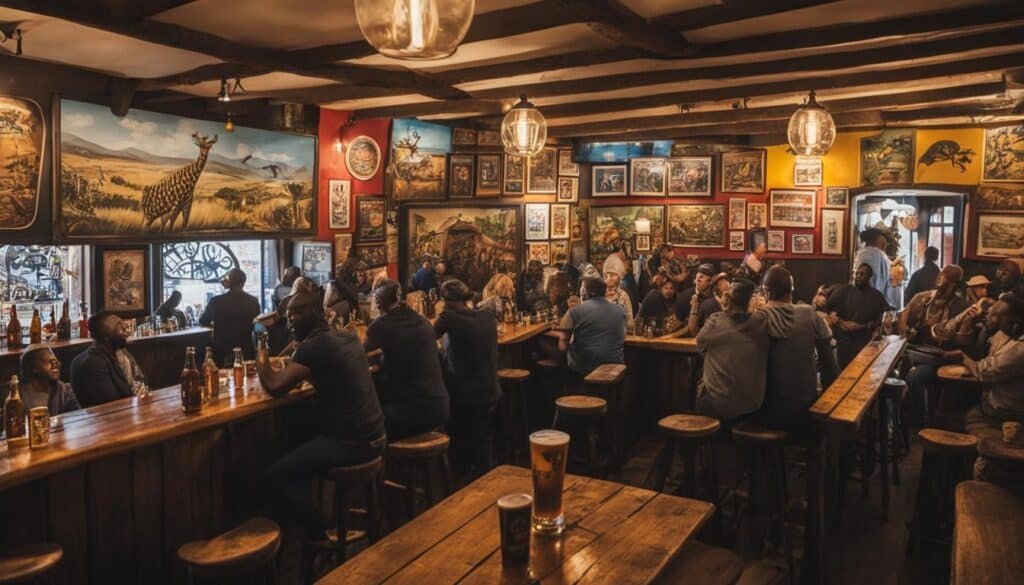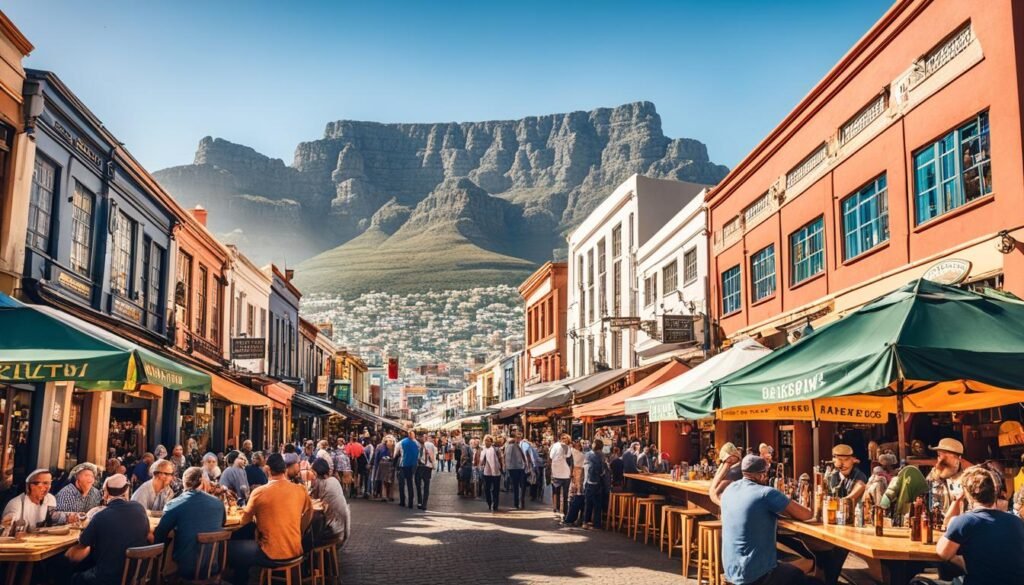Greetings, beer enthusiasts! Today, we embark on a journey to unravel the fascinating story of South Africa’s original beer. As we delve into the history and culture of South African beer, we will uncover the roots of this beloved beverage and the traditions that have shaped it into what it is today.
South African beer has a rich and diverse heritage, blending influences from European settlers and indigenous brewing practices. It all began in 1658 when Jan van Riebeeck brewed the first beer in South Africa. Since then, European immigrants from the 17th and 19th centuries have contributed their brewing expertise, while indigenous groups like the Sotho, Zulu, and Xhosa have been brewing sorghum-based beers for centuries.
One such traditional beer is umqombothi, which is still enjoyed in the Transkei region today. Made from maize, sorghum malt, yeast, and water, umqombothi holds a special place in South African beer culture. And let’s not forget about Castle Lager, one of the most popular beers in the country, produced by South African Breweries.
Key Takeaways:
- The history of South African beer is shaped by European settlers and indigenous brewing traditions.
- The first beer in South Africa was brewed in 1658 by Jan van Riebeeck.
- Indigenous groups like the Sotho, Zulu, and Xhosa have been brewing sorghum-based beers for centuries.
- Umqombothi, a traditional South African beer, is still enjoyed in the Transkei region today.
- Castle Lager, produced by South African Breweries, is one of the country’s most popular beers.
The Heritage of South African Beer
The history of beer in South Africa is a fascinating blend of colonial influences and indigenous brewing traditions. When European settlers arrived in the country, they brought with them their knowledge of brewing and introduced new brewing techniques and ingredients.
At the same time, indigenous groups like the Zulu and Xhosa had been brewing their own traditional beers using sorghum, a local grain. These sorghum-based beers were an integral part of their cultural and social practices.
A significant milestone in the history of South African beer was the establishment of the first commercial brewery, Castle Brewery, in Johannesburg in 1895.
“The history of South African beer reflects both the impact of colonization and the resilience of indigenous brewing practices.” – South African Brewing Historian
During the apartheid era, there were attempts to suppress African women’s brewing traditions. However, traditional beers like umqombothi, made from maize, sorghum malt, yeast, and water, continued to be cherished and enjoyed in South African households.
The Significance of Traditional Beer in South Africa
Traditional beer holds a special place in South African culture as it is not merely a beverage but also a symbol of unity and celebration. It is often brewed for special occasions, ceremonies, and gatherings. The process of making traditional beer involves communal effort, with women playing a central role in its preparation.
The Influence of European Brewing Techniques
The arrival of European settlers in South Africa brought about the introduction of new brewing techniques, ingredients, and beer styles. The settlers brought with them brewing knowledge from their respective countries, resulting in a fusion of European and African brewing traditions. This cross-pollination of brewing practices shaped the unique beer culture in South Africa.
Preserving South Africa’s Brewing Heritage
Despite the challenges faced by traditional South African beer in the modern era, efforts are being made to preserve and promote indigenous brewing practices. Organizations like Slow Food International are working to revive traditional brewing techniques and ensure that these cultural practices are passed on to future generations.
Through these efforts, South Africa’s brewing heritage continues to be celebrated and appreciated, both within the country and internationally.
The Modern Beer Culture in South Africa
South Africa boasts a vibrant beer culture, with a wide selection of local and international brands that cater to the diverse tastes of beer enthusiasts. Whether you prefer a refreshing lager or a complex craft brew, there’s something for everyone in the South African beer scene.
At the forefront of the market is South African Breweries (SAB), which owns and produces some of the country’s most popular beers. Castle Lager, Carling Black Label, and Hansa Pilsner are just a few examples of the iconic brands under the SAB umbrella.
But it’s not just about the big players. In recent years, the craft beer movement has taken South Africa by storm, attracting a growing number of microbreweries. With over 200 craft breweries scattered across the country, beer enthusiasts have access to an incredible variety of flavors and styles. From hoppy IPAs to rich stouts, South African craft breweries are pushing boundaries and exploring new frontiers in beer production.
Beer consumption in South Africa is higher than the African average, with an impressive 60 liters per capita in 2012. This demonstrates the deep-rooted beer culture in the country and the passion of its people for the frothy beverage. Beer is not just a drink but a way to connect, celebrate, and appreciate the craft behind every brew.
Beer tourism has also gained popularity in recent years. Initiatives like the Beer Route and KZN Craft Revolution are promoting the exploration of local breweries, allowing visitors to immerse themselves in the vibrant beer culture and discover the hidden gems of South African brewing.
So, whether you’re a fan of the classics or looking to discover the latest offerings from craft breweries, South Africa’s beer culture has something to offer every beer lover.

The Challenges Facing Traditional South African Beer
Despite the rich history and cultural significance of traditional South African beer, it is facing challenges in the modern era. The younger generation is turning towards mass-produced lagers and imported beers, viewing traditional beer as outdated or unsophisticated. Women who have traditionally brewed umqombothi are finding it difficult to sustain their businesses as demand decreases. Organizations like Slow Food International are working to revive and preserve traditional brewing practices, but there is still a risk of traditional South African beer disappearing.
Exploring the South African Craft Beer Scene
The craft beer scene in South Africa has experienced significant growth in recent years, offering beer enthusiasts a wide range of unique and flavorful options. Microbreweries have popped up across the country, showcasing the creativity and passion of local brewers.
Some notable craft breweries in South Africa include:
- Devil’s Peak Brewing Company in Cape Town
- Darling Brew in Darling
- Jack Black Brewing Company in Johannesburg
These breweries are known for their high-quality craft beers, which cater to a variety of tastes and preferences. From hoppy IPAs to smooth stouts, there is something for everyone to enjoy.
South Africa is also home to several exciting beer festivals that celebrate the craft beer culture. These festivals provide a platform for local breweries to showcase their brews and allow attendees to sample different craft beers while enjoying live music and delicious food.
Some popular beer festivals in South Africa are:
- Clarens Craft Beer Festival
- Cape Town Festival of Beer
These festivals attract beer enthusiasts from all over the country who gather to explore the diverse and vibrant craft beer scene in South Africa.

The image above represents the dynamic and colorful atmosphere of a South African craft beer festival, showcasing the passion and creativity behind the country’s craft beer industry.
Whether you’re a seasoned beer connoisseur or simply someone looking to explore new flavors, South Africa’s craft beer scene offers a plethora of options to satisfy your taste buds. From small, independent breweries to larger craft beer establishments, the country’s beer culture continues to thrive and captivate beer enthusiasts nationwide.
Conclusion
South Africa’s beer culture is a testament to its rich history and diverse brewing traditions. From the early days of European settlement to the indigenous brewing practices of local tribes, South African beer has flourished and evolved over the centuries.
While traditional beers like umqombothi face challenges in the modern era, the country’s craft beer scene is thriving. With a plethora of microbreweries offering a wide variety of flavors and styles, beer enthusiasts in South Africa are spoiled for choice. From the refreshing lagers to the bold IPAs, there is something to satisfy every palate.
As we explore the world of South African beer, we uncover a tapestry of taste, artistry, and cultural heritage. Whether it’s sipping on the original beer in South Africa or enjoying the innovative brews crafted by local artisans, beer holds a special place in the hearts of South Africans. So, raise a glass and toast to the vibrant and ever-evolving beer culture of South Africa.
FAQ
What is the original beer in South Africa?
The first beer brewed in South Africa was made by Jan van Riebeeck in 1658.
What is the history of South African beer?
South African beer has a long history, influenced by European settlers and indigenous brewing traditions. European immigrants brought their brewing expertise, while groups like the Zulu and Xhosa brewed sorghum-based beers.
What is umqombothi?
Umqombothi is a traditional South African beer made from maize, sorghum malt, yeast, and water. It is still enjoyed in the Transkei region today.
How popular is Castle Lager in South Africa?
Castle Lager, produced by South African Breweries, is one of the most popular beers in the country.
Is traditional South African beer facing challenges?
Yes, traditional South African beer is facing challenges as younger generations turn towards mass-produced and imported beers, and women who have traditionally brewed umqombothi struggle to sustain their businesses.
What is the craft beer scene like in South Africa?
South Africa has a thriving craft beer scene with over 200 microbreweries producing a wide range of flavors and styles. Some notable craft breweries include Devil’s Peak Brewing Company, Darling Brew, and Jack Black Brewing Company.
Are there beer festivals in South Africa?
Yes, South Africa hosts various beer festivals, including the Clarens Craft Beer Festival and Cape Town Festival of Beer.
